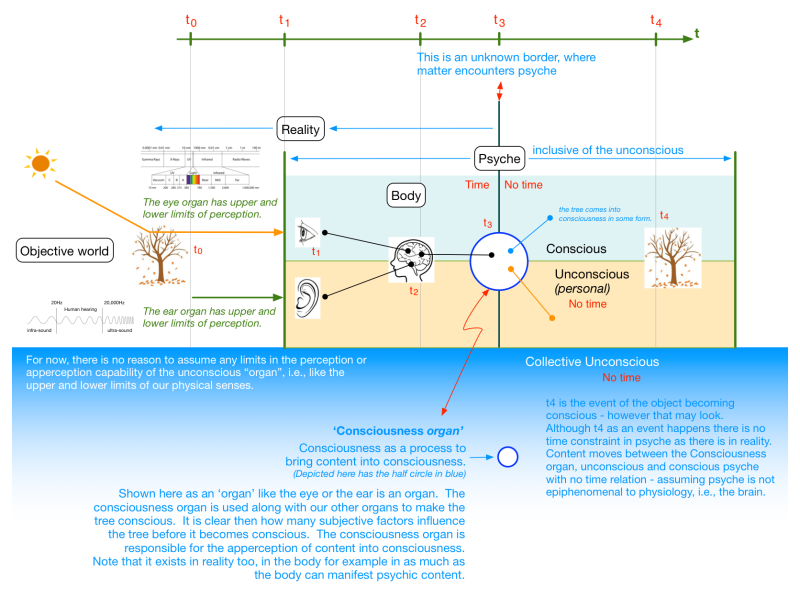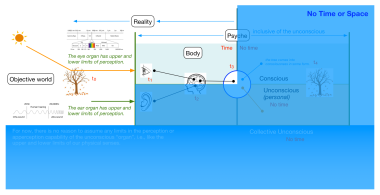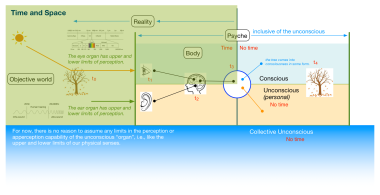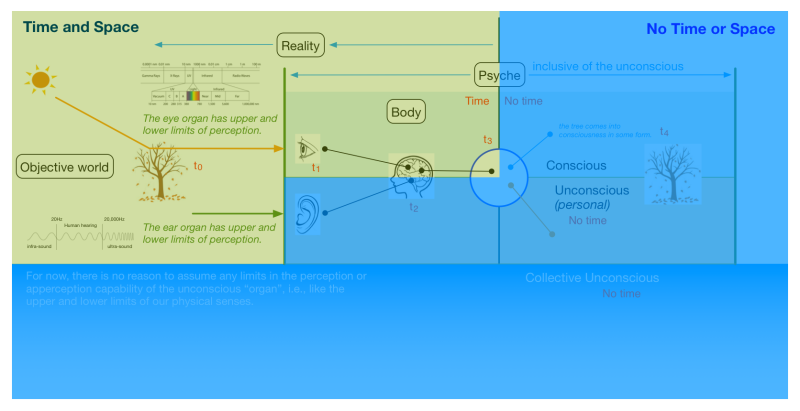Space and time
This section is more of a blog covering ideas about time-space, artificial intelligence and the psyche.
Consciousness, space and time
Space predicates time.
Space predicates movement.
Movement predicates time??
A model of perception and apperception

This model is not considered at the quantum level.
t0 = An event or object in space and time. This object or event is there, it happens. In this example, a tree.
t1 = The particular sense elements reach us. Eye's (= light) and ears (= sound waves) are shown in the diagram but they could be any sense related apparatus that we can perceive with our eyes.
t2 = t1 to t2 is the time it takes our sense apparatus to send signals and for the brain matter to receive the signal. For example, the time it takes for the signal to travel via the optic nerve to the brain with the information about the object.
xRef research The effects of age on sensory thresholds and temporal gap detection in hearing, vision, and touch
Also telling time
t3 = t2 to t3 is the time for the brain to perceive or place these signals into the brain as a tree. I'm not even sure if this is the correct way to describe this.
t4 = t3 is the point at which the tree as an engram exists in the brain. It would be reasonable to assume t4 is equal to t3 were it not for the fact that consciousness of the tree is different to the engram of the tree in the brain. Moreover as I mention later, the object may already exist in consciousness without having been seen and placed as an engram into the brain. In this example it is a tree but it could be anything.
That said there is another objection to t3 and t4 being separate times: t4 exists where there is no time. The coming to consciousness of the tree object occurs in a non-time place, the place of psyche and consciousness. This raises questions about the limitations of the psyche to bring objects to consciousness. I do not know those questions and I think it has something to do with the border between psyche and matter. Perhaps t4 is not a time marker but the event of the tree coming into consciousness.
Questions:
Memory engrams reside in the brain so therefore must reside there as well as in consciousness, in psyche. The content must be perceived by consciousness in some way. When is the tree recognised in the brain and consciousness and does it depend on the engram?
Would it be conceivably possible to dream with no memory engram? Dream content often uses content personal to us from our day to day experiences - would this be possible without memory engrams? The personal unconscious would no doubt contribute.
If death as we know it is essentially corporeal death does - what would be a good investigation to understand whether our existence continues in the non-time and space zone in the model above?
Artificial intelligence
Hypothesis:
AI can only exist in the Time and Space zone. For this reason, AI will never be sentient because it will lack any consciousness. Consciousness requires psyche in a non-time space aspect.
I like this quote:
Or, as computer scientist Donald Knuth puts it, “AI has by now succeeded in doing essentially everything that requires ‘thinking’ but has failed to do most of what people and animals do ‘without thinking.'”
Found in a post on waitbuywhy.com blog
Reference from the wiki
A list of references from the text throughout the site where τ is used to annotate the reference to Space and time. In addition to references to the concept of time, many cases are the motif “time / no-time”; things that happen in time-space and the complementarity of the same event in no-time-space as per the model above. For example; events that are perceived consciously but also unconsciously.
Some interesting quotes
A teleology is any philosophical account which holds that final causes exist in nature, meaning that design and purpose analogous to that found in human actions are inherent also in the rest of nature. The word comes from the Greek τέλος, telos; root: τελε-, “end, purpose”. The adjective “teleological” has a broader usage, for example in discussions where particular ethical theories or types of computer programs are sometimes described as teleological because they involve aiming at goals.
Entelechy : From Driesch “…a term borrowed from Aristotle's philosophy to indicate a life force which he conceived of as psychoid or “mind-like”, that is; non-spatial, intensive, and qualitative rather than spatial, extensive, and quantitative.” Also, see wiktionary : Etymology - From Late Latin entelechia, from Ancient Greek ἐντελέχεια (entelékheia), coined by Aristotle from ἐντελής (entelés, “complete, finished, perfect”) (from τέλος (télos, “end, fruition, accomplishment”)) + ἔχω (ékho, “to have”). Cf. CW8 p191, footnote 61.
…that gravity should be innate, inherent and essential to matter, so that one body may act upon another at a distance through a vacuum, without the mediation of anything else, by and through which their action and force may be conveyed from one to another, is to me so great an absurdity that I believe no man who has in philosophical matters a competent faculty of thinking can ever fall into it. Gravity must be caused by an agent acting constantly according to certain laws, but whether this agent be material or immaterial, I have left to the consideration of my readers.
Isaac Newton (1692)
I have not as yet been able to discover the reason for these properties of gravity from phenomena, and I do not feign hypotheses. For whatever is not deduced from the phenomena must be called a hypothesis; and hypotheses, whether metaphysical or physical, or based on occult qualities, or mechanical, have no place in experimental philosophy. In this philosophy particular propositions are inferred from the phenomena, and afterwards rendered general by induction.
Isaac Newton (1713)
Mechanical explanations of gravitation
Hypotheses non fingo - 'I feign no hypotheses'.
Whatever difficulties we may have in forming a consistent idea of the constitution of ether, there can be no doubt that the interplanetary and interstellar spaces are not empty, but are occupied by a material substance or body, which is certainly the largest and probably the most uniform body of which we have any knowledge.
James Clerk Maxwell


